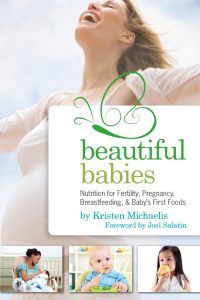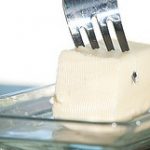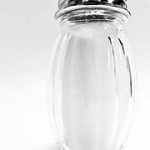I’m a newlywed wife, living with my husband… and my mother-and-father-in-law.
Pure marital bliss, y’all, let me tell ya. But as I’m sure you can imagine, it’s not exactly ideal baby-making conditions around here. While my husband and I are so grateful for his folks’ generosity in allowing us to crash at their place while we’re still getting on our feet from our big move across the Pacific, we’re definitely not in any position to be procreating any time soon.
In spite of this, however, I have been making an effort to eat as though I were currently, or trying to get, pregnant.
Why? Because I anticipate that probably sometime in the maybe somewhat possibly semi-near but not-super-soon but perhaps sometime eventually maybe we might in the future at some point feasibly…
*gaspingforair*
… have a baby.
Since, much as I’d like not to admit it — we are technically grown-ups now, and all. With wedding rings and jobs and everything. We can do that sort of thing. Well, hopefully after we’ve actually procured our own place of residence. That’s kind of an adult prerequisite, if you ask me.
But because nature has a way of not always working out with whatever one’s perfect timing may be, and because we do plan on having children at some point, I am eating like I mean baby-business. Because I want to ensure that I’m setting up my body with proper nutritional stores in order to help shape the health of my future kids.
Yes, what you eat, even well before you are pregnant, matters for your babies. And it matters for having a healthy, easier pregnancy.
This is something that many cultures have known for a really, really long time. Traditionally, expectant mothers, and even fathers, from many corners of the world, have always prepared themselves for child-bearing by upping the ante of their diet to include as many nutrient-dense foods as possible.
Traditional Wisdom and the Preconception Diet
Dr. Weston A. Price, a dentist and anthropological nutrition researcher, studied isolated groups of such traditional cultures in the 1930s to determine why they were so much healthier than the people of modern western society. It concerned him that the new generation of youth at that time was in such poor health compared to those not long before them, and how this change directly coincided with the rapid industrialization of the food supply. But the traditional people Dr. Price encountered in his studies hadn’t been exposed to modern industrial fare, and they continued to reap the benefits of the healthy diets they had maintained for ages. Especially their specific adherence to pre-conception dietary traditions.
Kristen Michaelis, author of the new book, Beautiful Babies, explains:
In his study of healthy traditional people, Dr. Price observed that couples ate specialized preconception diets for anywhere from six months to a year before getting pregnant. These diets were rich in a few key nutrients that radically increased fertility. They provided an optimal balance of nutrition for sustaining the health of mother, father, and infant.
Modern science has revealed that it takes nearly a hundred days for a woman’s egg to mature before it is ovulated and seventy-two days for a man’s sperm to form. This suggests that at the very least, a three-month period of optimal nutrition for a couple will produce the healthiest-possible egg and sperm. So, why did couples in these traditional societies stretch out their fertility diets for six months to a year? It’s been theorized that in a window of six to twelve months, the first half to three-quarters of that time was to help the body detox and heal, while the last three months promoted maximum fertility.
Isn’t that crazy? The very egg and sperm from which your future child will be conceived, takes months to mature and develop inside mom and dad’s bodies. That’s a really big deal.
What you eat during that time matters. We definitely know that the things we eat while pregnant can have a profound effect on the health of an unborn baby — which is why we’re supposed to eat lots of protein for baby’s development, but are not supposed to consume foods that could potentially pose risks such as cold lunch meats or alcohol.
But just as everyone knows that what you do or do not eat during your pregnancy can affect the health and development of your child, your diet before pregnancy occurs does as well. Even modern doctors will tell you that it’s best if you take a prenatal vitamin if there’s any chance you could get pregnant, so that you’ll have enough folic acid to prevent neural tube defects, like spina bifida, which can develop in a newly-conceived fetus should you be deficient.
So if getting enough of certain nutrients can prevent deformities in your child, even before you are pregnant, shouldn’t getting plentiful amounts of all the nutrients your baby needs help it to be more than just… not-deformed… but as healthy and physically well-developed as it can be?
Nutrition not only affects your baby’s development, but it also plays a key role in helping you get pregnant in the first place.
Traditional preconception diets ensure optimal fertility

Have you ever known someone who tried to eat a “healthy” diet while trying to conceive, by cutting out fat at the advice of their doctor?
Probably so, since low-fat diets are so commonly recommended. How did that work out for them? Did they struggle to get pregnant, and even have to turn to medical fertility interventions as they failed to conceive month after month? (Celeb TV star Giuliana Rancic comes to mind…)
It’s so sad to me. Because women who eat a low-fat diet are actually 85% more likely to be infertile.
Getting the right fats, in plentiful amounts, is critically important for fertility. But beyond that, many other key nutrients such as vitamins A, D, E, and K (which are fat-soluble) have a huge impact on fertility as well. Preconception diets of the cultures which Dr. Price studied traditionally included foods that are very dense in those nutrients, as well as the fats needed to assimilate them.
The result? Infertility just plain didn’t exist with them. As Kristen explains in Beautiful Babies, infertility is actually a mostly new and modern phenomenon.
So are things like vegetables slathered in chemical pesticides, “sugar” made from genetically-engineered corn, and neurotoxic additives in packaged foods. Things that just were not around a hundred years ago.
We eat a lot of things we shouldn’t these days. But we also aren’t eating a lot of the things we need for our own health, and for our ability to have healthy kids.
How a preconception diet affects pregnancy
It seems pretty logical to me that your diet could have an effect on fertility and how easily you’re able to get pregnant. But did you know that what you eat before you’re pregnant can affect things like whether or not you experience morning sickness, overpowering cravings, or aversions to certain foods? I was surprised to learn that.
Problems like these can arise because they’re actually a symptom of nutrient deficiency. But if you don’t have sufficient stores of key nutrients you need to prevent these problems by the time you’re pregnant, it may be too late to catch up.
Magnesium, for example, is critical in preventing morning sickness. But it can take months to accumulate high enough levels of magnesium to have that effect. You can prevent other unpleasant pregnancy symptoms too, like varicose veins and excessive swelling, by making sure your pre-pregnancy diet is rich in all the nutrients your body needs to fend off those things.
Dr. Price found that the diet of women in traditional cultures was ten times higher in fat-soluble vitamins than the modern western diet. They prepared for pregnancy by eating foods so high in these critical nutrients that they were considered “sacred.” Foods rich in vitamins A, D, E, and K; DHA, arachadonic acid, choline, biotin, and all the B-complex vitamins. The more we can mimic what they did to boost up the body’s nutritional stores for pregnancy, the better our bodies can stay healthy while nourishing our children in pregnancy, and beyond when we breastfeed.
What should you eat for pre-conception?
Eating a proper, traditional preconception diet isn’t hard to do. It’s really not all that far off from what I would normally eat — I just make sure to include things that I might otherwise skip. But once you make a habit of including these foods, it’s easy to get the best nutrition possible for you and your future babies.
Here’s what you need.
Plenty of full-fat dairy, preferably raw.
Not everyone has access to raw milk, but if you can, get it. The WAPF recommends drinking a quart of raw milk a day. I simply make sure that if I’m going to be drinking something, it’s primarily fresh milk from grass-fed cows, and worry less about the exact amount I’m consuming.
If you can’t get raw milk, aim for getting plenty of grass-fed dairy. You can find grass-fed dairy products fairly easily. Look for grass-fed cheeses at natural food stores, and Kerrygold butter, which comes from grass-fed cows in Ireland (and is the most amazing butter ever). Butter is where all those important vitamins found in dairy are concentrated the most, especially vitamin K2 which is critical for proper skeletal formation and genetic expression. Eat it up!
Coconut oil.
In addition to butter, coconut oil is recommended. Coconut oil is not only a great source of healthy saturated fat, but it is also very high in antioxidants and is potently anti-inflammatory. Cook with it, add it to your food, even stir a little into your coffee if you’d like!
Find quality coconut oil here.
Pastured eggs, ideally 2+ whole eggs, plus yolks.
Store-bought eggs that are from conventional farms — or even organic farms — aren’t anywhere near as beneficial as eggs from truly pasture-raised hens. Most of the nutrition — choline, cholesterol (critical for a developing neurological system), and vitamins A and E — is concentrated in the yolk, and it’s even better if you can consume the yolks raw. Add them with your raw milk and coconut oil and mix up a berry smoothie!
Seafood, at least a couple times per week.
Fish is very dense in many key nutrients, including essential fatty acids not found anywhere else, like DHA and EPA, which are vital for eye and brain health and development in babies. But even more nutrient-dense are shellfish like oysters, mussels, crabs, and shrimp. That’s because if you eat everything inside that shell (like when you slurp down an oyster), you’re consuming a whole animal — organs and all! Organs are far more nutritious than muscle meats. Another highly nutrient-dense form of seafood is fish roe. Those little eggs are tasty on a cracker with cheese, and are one of the most potent fertility foods you can eat!
Liver, 3-4 ounces, 1-2 times a week.
The big daddy of all the sacred fertility and preconception superfoods. Liver is by far one of the most nutrient-dense foods on the planet. Traditional cultures always made sure to provide women with plenty of liver well before they married or were ready to conceive, so they could build up vital stores of the nutrients found in this amazing food. If you’re not real into the idea of grandma’s famous liver and onions, you can mix it into ground beef at a ratio of about 1:5 liver to beef, without affecting the taste noticeably.
Don’t think you can stomach eating liver, period? No problem. You can get quality grass-fed dehydrated liver in powdered form and easy-to-swallow capsules available here.
Bone broth.
Homemade broth from bones slowly simmered for 24 hours or more is rich in many critical minerals important for overall health and fertility, like calcium and magnesium. It’s also rich in gelatin, which contains the collagen your body needs for growing tissues, and to bring elasticity to expanding bellies (which can prevent stretch marks)! Having a cup of soup made with bone broth with dinner is a nice way to get a good dose, or you can reduce broth down into a gravy and add it to your food.
Cod liver oil
Getting plentiful amounts of vitamins D and A is critical for preparing for a healthy pregnancy. D and A work synergistically — they need each other in a very specific ratio to do their jobs best. And vitamin A? Kristen describes it as “the symphony conductor for pregnancy—without it an entire cascade of processes necessary for successful conception, pregnancy, and birth would go wrong.” For women preparing for pregnancy, and for those who are pregnant, 20,000 IU of vitamin A daily is recommended, with 2,000-4,000 IU vitamin D.
The best food source for both of these vitamins in exactly the right amounts is cod liver oil. But neither Kristen nor I recommend picking up just any cod liver oil found at a health food store. Most brands are highly processed and made with synthetic vitamins, instead of natural.
I recommend quality cod liver oil found here.
Plenty of foods with natural folate, like asparagus, legumes, and leafy greens.
Did you know there’s actually no such thing as natural folic acid found in foods? That’s because folic acid is a synthetic supplement designed to replicate folate, which is the natural form. You really don’t need that prenatal supplement with folic acid, if you’re getting enough folate from real foods. Liver, eggs, and grass-fed dairy are great sources of folate, but getting your greens is important to boost your folate even higher. Like asparagus, there’s 85 micrograms of folate in just four spears of it!
Want to learn more?
If you’re interested in learning more about what you can do to prepare for healthy childbearing, check out Kristen’s new paperback book, Beautiful Babies. I got a couple of extra copies, myself, so I can give them to friends and family members as gifts. It would make a great baby shower present, but probably even better as a wedding gift! I mean, that’s not too weird, right? “Here’s a book that teaches you how to eat better so you can pop out a healthy kid. Happy procreating!!”
You’ll thank me later when you don’t get stretch marks and Junior doesn’t need braces. 😉
[disclosure: cmp.ly/4; cmp.ly/5]








*delurks*
I totally agree and I am eating the same way. My hubby and I will most likely be conceiving our first within the next year. It always perturbs me why there are always allllll these recommendations for how to eat while pregnant or breastfeeding but VERY little to no recommendations on how to eat for preconception. There is very little guidance on preconception readiness anyway (past popping prenatals anyway), even though they’ll turn around and say that how the mother ate and took care of herself prior to conception is THE most important of all.
I so agree with this post! I try to eat *as though* I am pregnant at all times, even when I am not. Though I don’t tell people that, because they think I am nuts!
I would love it if you shared this at my blog hop, the Saturday Round Up!!
http://ajoyfulmother.com/2013/02/22/saturday-round-up-a-new-blog-hop/
I am so glad you wrote this Emily! Thank you, thank you thank you! I have friends who constantly tease me about eating foods that are for “baby making” and don’t believe me when I am trying to tell them we are not trying to get pregnant this year. I will be sending you this article. You have some great points in here that i have not considered before that makes me want to eat my fertility diet even more!
I would add that all women of child-bearing age should be eating this diet because, well, accidents happen. And what peace of mind it would bring to know that your body was well prepared, even if you weren’t?
Thanks for a great post… very important information! It drove me crazy to see some of my friends using their pregnancies as an excuse to eat extra ice cream or super-sized orders of fries all the time because they are eating for two. (facepalm!) My midwife told me that she could tell I had amazing nutrition because my (ahem) body parts were very elastic and I had a fantastic birth and recovery.
This is a great resource! Make a note too, if you have thyroid issues, to avoid goitrogen foods (thyroid suppressing) and if you have trouble getting pregnant…even the presence of thyroid antibodies can create a miscarraige and prevent pregnancy, in that case, you may want to avoid or lessen your gluten intake.
Great article, but I am leary about taking vitamin A because it can increase the risk of a miscarriage early on in the pregnancy. My hubby and I are ttc, and I make sure that he gets his vitamin A, but as for myself the only vitamin A that I get that’s not in my diet is in my pre-natal vitamin.
I really wish I’d understood all this before I had my babies – we have ADHD and ASD in our family and I firmly believe this could have been alleviated had I changed things up before conception.
Thanks for getting the message out into the world!
Much appreciated
Shelley Belcourt
Eating lots of saturated fat, cholesterol, and fat soluble vitamins really CAN improve your fertility! Only a few short years ago, I discovered that I was not ovulating, which really freaked me out. Of course, I was eating a low-fat vegetarian nearly vegan diet at the time. I had a lot of other health problems too. But the ovulation thing really made it clear to me that something about my diet wasn’t working out. That’s when I discovered Weston A. Price.
Within a couple years of beginning my dietary transformation, my monthly cycles had become regular for the first time ever, and stayed that way for over a year, at which point I received the real proof that my ovulation had returned – pregnancy! My pregnancy has been pretty easy so far – I had about 4 weeks of minor morning sickness, which really wasn’t that big of a deal, and now I feel great, at 5 1/2 months.
In your opinion, what should someone do who is pregnant or wants to conceive but has tested positive for a gluten intolerance, as well as a cross reactive response to dairy (raw included)? Is it better to go ahead and get the benefits of raw dairy for the baby, or to avoid it all together and try to replace or supplement dairy with something else?
Thanks for all the info!
I have been married for the past 3years without a child i have look for all kind of help that can make me get pregnant but nothing works, but through an insight i came across Dr.BABA profile at the internet when i was searching for help on how i can get pregnant Quickly i contacted him to help me out, he said he will cast a spell that will make me get pregnant, he cast the spell for me and ask me to go and have sex with my partner so i did to my greatest surprise i became pregnant after some weeks, with so much joy in my heart i want to share this out to everyone in need that i have found favor in the hands of DR.BABA, contact him now to via email : fertilitysolutiontemple@live.com or on mobile number on:+2349036348369,Casey Deborah